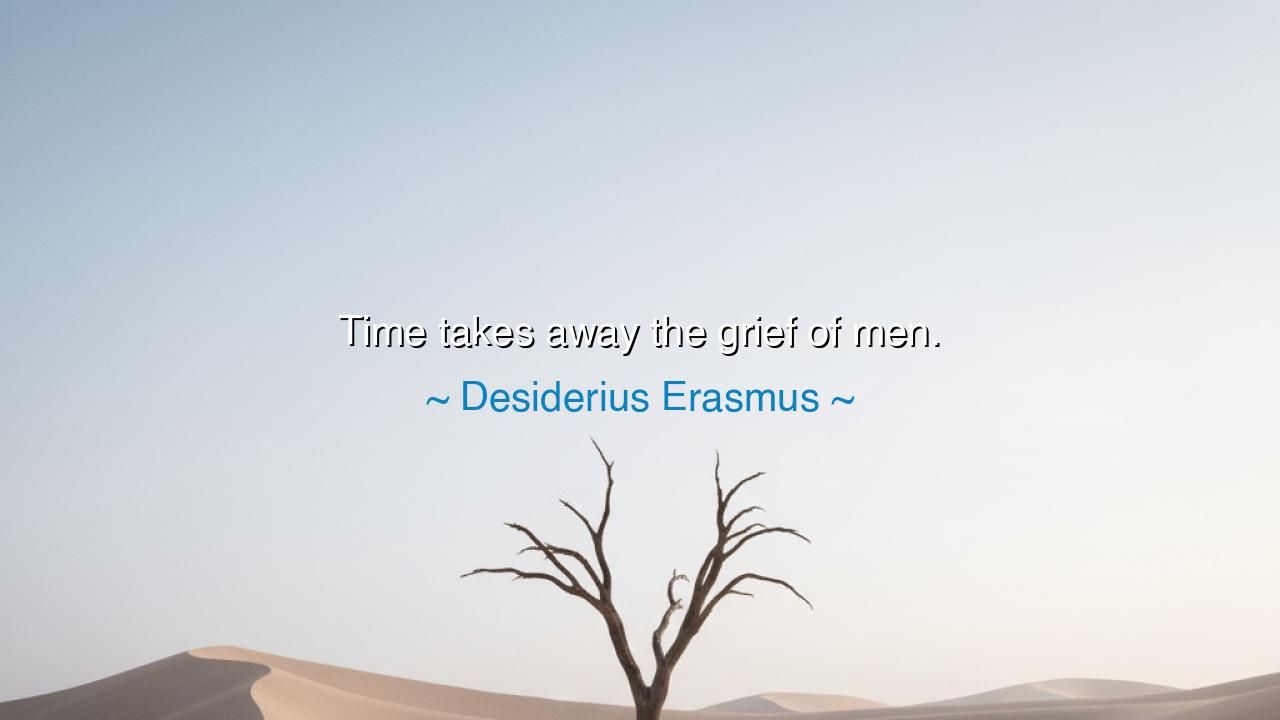
Time takes away the grief of men.






Hear the voice of Desiderius Erasmus, scholar of the Renaissance and lover of wisdom, who declared: “Time takes away the grief of men.” These words, though simple, carry the weight of centuries of sorrow and healing. They are not the cold pronouncement of a philosopher unmoved by pain, but the gentle recognition of one who knew that all wounds, no matter how deep, are softened by the slow passing of the hours. For grief is sharp like fire at its beginning, yet even fire dies when the fuel is gone, and in the great river of time, the fiercest pain is carried away.
The meaning of these words is this: time is a healer. When misfortune strikes, when loved ones are lost, when betrayal pierces the heart, the wound at first seems unendurable. Yet as the days unfold, as seasons change, the human soul adjusts, learns, remembers with less sting. Grief is never wholly erased—it leaves its scars—but it loses its tyranny. Time does not erase love, nor dishonor memory, but it dulls the knife so that life can continue. Thus Erasmus teaches us that patience, endurance, and the slow turning of days are themselves a medicine for sorrow.
The origin of this saying rests in the world of Erasmus himself. He lived in an age of turmoil—of wars, of plague, of schism within the Church he sought to reform. He witnessed suffering not only in individuals but in nations. Yet he also saw that humanity, though crushed by grief, always rose again with the passing of years. Civilizations rebuild, families recover, hearts mend. From this vision he declared his truth: that time itself is the ally of endurance, and that even the heaviest grief will one day be lightened by its passage.
History too confirms this wisdom. Think of Abraham Lincoln, shattered by the death of his son Willie. In the first days, grief nearly broke him, yet as years passed, he bore the sorrow with quiet dignity, learning to channel his pain into compassion and resolve. Or recall the people of Hiroshima, whose city was consumed by flame and loss. At first the grief seemed insurmountable, yet with time, they rebuilt their city into a place of peace and remembrance. Their sorrow was not destroyed, but it was tempered, made bearable by the slow, merciful working of years.
This truth is not only for the mighty, but for every soul. Each person carries grief—whether of death, disappointment, or broken hope. At first it seems eternal, yet the words of Erasmus remind us that time will soften it. We must not despair in the depth of sorrow, for the wheel of days continues to turn, and with each turn comes healing, unseen but real. This is not to dismiss grief, but to honor the resilience of the human spirit, which finds strength in the passing of seasons.
Yet the lesson comes with a warning: though time softens grief, it is also the soul’s duty to allow healing to come. If we cling to pain, feeding it with bitterness, then years may pass but peace will not come. Time opens the door, but the heart must walk through it. Thus, Erasmus’s words are both comfort and counsel: trust in the healing power of days, but do not resist the peace they offer.
Practical action flows from this wisdom. In seasons of sorrow, be patient with yourself. Do not demand that grief vanish quickly, but trust in the gentle mercy of time. Honor your memories, but also allow new joys to enter when they arrive. Support others in their grief, not by rushing them, but by walking beside them until the days have done their work. And above all, remember that grief, though sharp, is not eternal; life, carried forward by time, holds more than pain.
Take this as a guiding flame: “Time takes away the grief of men.” Let these words remind you that sorrow, though heavy, is not endless. The wound will heal, the heart will mend, and though scars remain, they will not destroy you. Trust the river of time, for it flows toward peace, and in its waters, all grief is one day softened into memory.






AAdministratorAdministrator
Welcome, honored guests. Please leave a comment, we will respond soon